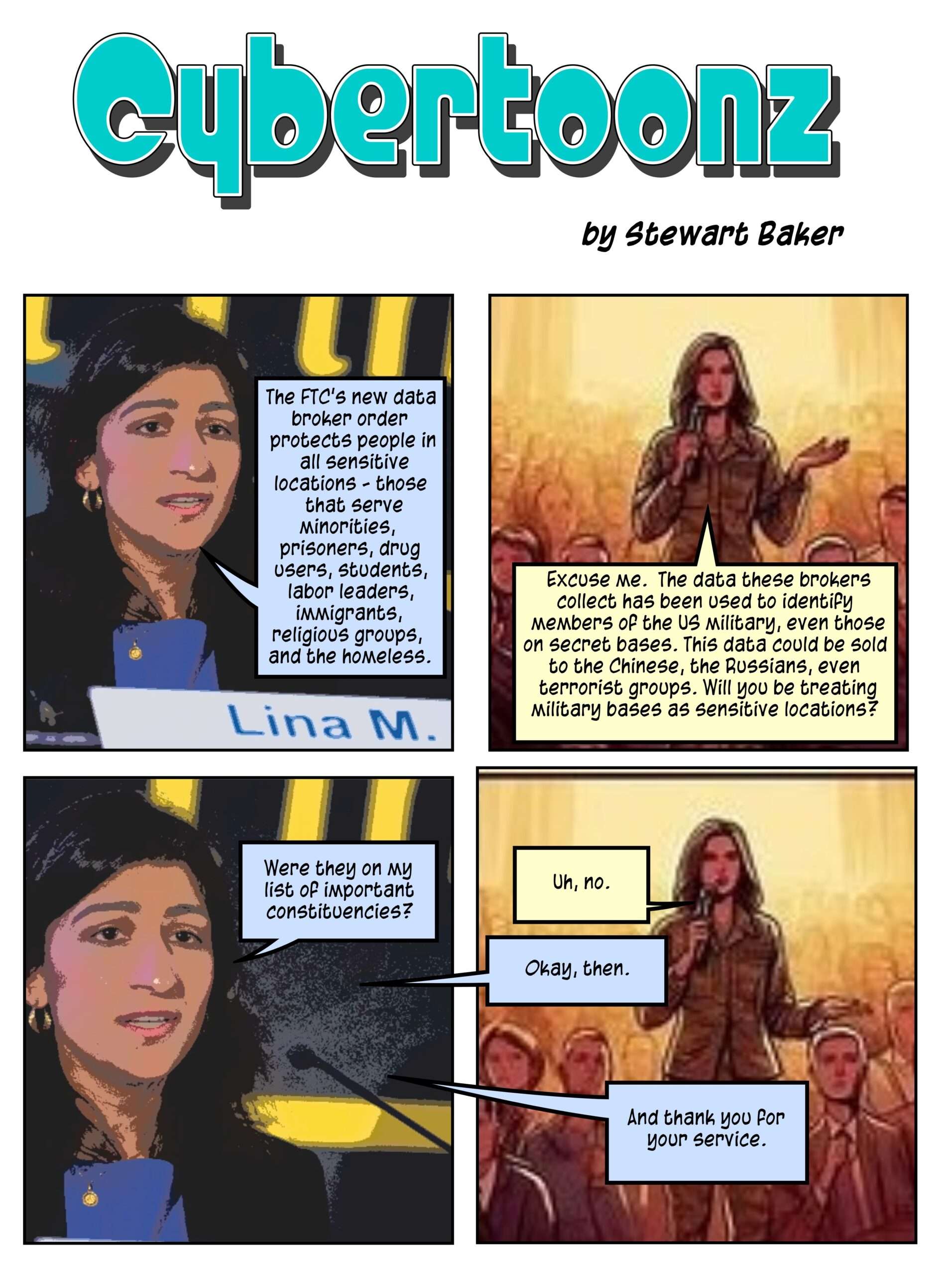The Volokh Conspiracy
Mostly law professors | Sometimes contrarian | Often libertarian | Always independent
The FTC defines sensitive locations for data brokers
Cybertoonz is not impressed
The FTC has begun a new campaign against data brokers who are collecting and selling "sensitive" location information. Cybertoonz asks the obvious question.
Editor's Note: We invite comments and request that they be civil and on-topic. We do not moderate or assume any responsibility for comments, which are owned by the readers who post them. Comments do not represent the views of Reason.com or Reason Foundation. We reserve the right to delete any comment for any reason at any time. Comments may only be edited within 5 minutes of posting. Report abuses.
Please to post comments


Once again Stewart, who apparently does not know any women or people of color, makes fun of their concerns.
Stewart has been around a long time and must be my age. My (mixed race) children in their 20’s are already less juvenile than he is. He really should get out more.
Stewart Baker fans don’t see color . . . just ask ‘em!
Bone Saw Baker it is!
Thank you.
Clearly, only women, BIPOCs, or other diverse individuals can have legitimate concerns. Unless they're members of an armed service, in which case their concerns are illegitimate. This is not at all a juvenile view.
Did you notice that she was in uniform?
I think you impute an incorrect motive here. Certainly women, minorities etc may have some heightened concerns but if your law makes a point of making sure you can’t target members of these groups at locations that **might** be a bit more likely to cause harm but doesn’t block sharing information in cases we have very strong reason to believe harm is caused it suggests it’s politically correct posturing not a serious policy concern.
Having said that I think his criticism is poorly choosen.
Why would you pretend to care about 'sensitive location' data gathering when you lobby on behalf of the murderer-friendly NGO Group?
You might as well wield the bone-saw yourself.
I listened to your podcast on this yesterday. FTC is claiming people can't publish location information about people in sensitive places.
* I stand on sidewalk outside abortion clinic.
* I video people going in and out.
* I publish those videos.
* I (or someone else) can run facial recognition on those videos and publish those names.
* I charge for access to publication.
Is that protected by the First Amendment?
Why wouldn’t it be? How does that differ from any other kind of news gathered in a public place?
tomhynes75, just to be clear, I do not suggest that doing what you describe is anything but malicious, and destructive to the public life of the nation. Problem is, there seems to be no way to outlaw it without too much burdening folks' 1A rights to expressive freedom. And also, opening the door to government censorship, which must not happen.
But, as with so many other similarly destructive practices, there is a better way to cope. Repeal Section 230, and henceforth that kind of publication would encounter from private editors the same kind of publicly-protective headwinds which formerly hampered publication of troop movements in wartime.
The practice you suggest would not thus be prevented. It would also not be respected, or much used, or spread very far when it was used. Publishers who did do as you mention would discover that doing it made it harder to continue in business, which is a strong deterrent.
I don't see why we should HAVE "secret" bases....
So they don't get targeted.
The brief really did nail Lina Khan on a personal level; she has the personality of a cold, wet fish.
Stop giving fish a bad name.
Well, dry, hot fish are usually dead, so I guess that's OK.
So what I'm learning here is that the US military needs the FTC to protect it against espionage. That seems troubling...
Welcome to the 21st century.
It seems like the principal concerns around data brokers and military personnel was just raised a couple of months ago, and since the Duke study that kicked it off doesn't identify the specific data brokers they used it's not clear that X-Mode and Outlogic were selling this data (although it seems likely they would based on what we know). So probably not surprising that this order just a couple of months later doesn't directly address that problem.
The "punchline" for the comic is pretty stupid, though, since the proposed order actually includes the following requirement to consider the addition of new categories of Sensentive Locations:
How can such a law actually work? Ok, I'm a data broker so I can't share information about when someone's location is in this sensitive list ...but I can tell you all the times they aren't in such a location and the times for which location data isn't available and their location right before and after data was available.
If I want to target that sensitive location can't I just target people whose location is censored and were adjacent to the sensitive location prior to that?